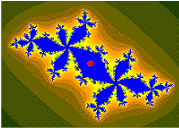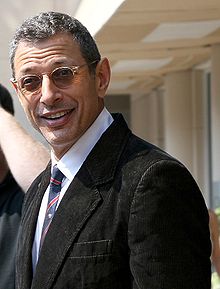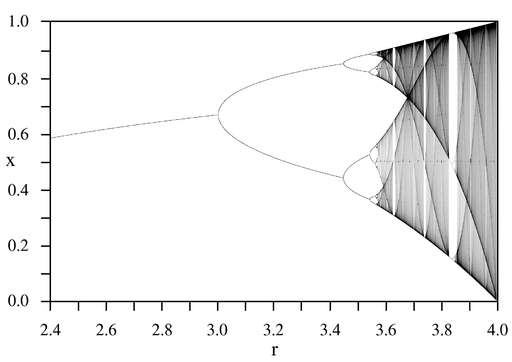
Ivar Ekeland
Encyclopedia

Functional analysis
Functional analysis is a branch of mathematical analysis, the core of which is formed by the study of vector spaces endowed with some kind of limit-related structure and the linear operators acting upon these spaces and respecting these structures in a suitable sense...
, the calculus of variations
Calculus of variations
Calculus of variations is a field of mathematics that deals with extremizing functionals, as opposed to ordinary calculus which deals with functions. A functional is usually a mapping from a set of functions to the real numbers. Functionals are often formed as definite integrals involving unknown...
, and mathematical economics
Mathematical economics
Mathematical economics is the application of mathematical methods to represent economic theories and analyze problems posed in economics. It allows formulation and derivation of key relationships in a theory with clarity, generality, rigor, and simplicity...
, as well as popular books on mathematics, which have been published in French, English, and other languages. Ekeland is known as the author of Ekeland's variational principle
Ekeland's variational principle
In mathematical analysis, Ekeland's variational principle, discovered by Ivar Ekeland, is a theorem that asserts that there exists nearly optimal solutions to some optimization problems....
and for his use of the Shapley–Folkman lemma
Shapley–Folkman lemma
In geometry and economics, the Shapley–Folkman lemma describes the Minkowski addition of sets in a vector space. Minkowski addition is defined as the addition of the sets' members: for example, adding the set consisting of the integers zero and one to itself yields the set consisting of...
in optimization theory
Optimization (mathematics)
In mathematics, computational science, or management science, mathematical optimization refers to the selection of a best element from some set of available alternatives....
. He has contributed to the periodic solutions of Hamiltonian system
Hamiltonian system
In physics and classical mechanics, a Hamiltonian system is a physical system in which forces are momentum invariant. Hamiltonian systems are studied in Hamiltonian mechanics....
s and particularly to the theory of Kreĭn indices for linear systems (Floquet theory). Ekeland helped to inspire the discussion of chaos theory in Michael Crichton's 1990 novel Jurassic Park.
Biography
Ekeland studied at the Ecole Normale SupérieureÉcole Normale Supérieure
The École normale supérieure is one of the most prestigious French grandes écoles...
(1963–1967). He is a Senior Research Fellow at the French National Centre for Scientific Research (CNRS). He obtained his doctorate in 1970. He teaches mathematics and economics at the Paris Dauphine University, at the Ecole Polytechnique
École Polytechnique
The École Polytechnique is a state-run institution of higher education and research in Palaiseau, Essonne, France, near Paris. Polytechnique is renowned for its four year undergraduate/graduate Master's program...
, at the École Spéciale Militaire de Saint-Cyr
École Spéciale Militaire de Saint-Cyr
The École Spéciale Militaire de Saint-Cyr is the foremost French military academy. Its official name is . It is often referred to as Saint-Cyr . Its motto is "Ils s'instruisent pour vaincre": literally "They study to vanquish" or "Training for victory"...
, and at the University of British Columbia
University of British Columbia
The University of British Columbia is a public research university. UBC’s two main campuses are situated in Vancouver and in Kelowna in the Okanagan Valley...
in Vancouver
Vancouver
Vancouver is a coastal seaport city on the mainland of British Columbia, Canada. It is the hub of Greater Vancouver, which, with over 2.3 million residents, is the third most populous metropolitan area in the country,...
. He was the chairman of Paris-Dauphine University from 1989 to 1994.
Ekeland is a recipient of the D'Alembert Prize and the Jean Rostand prize. He is also a member of the Norwegian Academy of Science and Letters
Norwegian Academy of Science and Letters
The Norwegian Academy of Science and Letters is a learned society based in Oslo, Norway.-History:The University of Oslo was established in 1811. The idea of a learned society in Christiania surfaced for the first time in 1841. The city of Throndhjem had no university, but had a learned...
.
Popular science: Jurassic Park by Crichton and Spielberg

Popular science
Popular science, sometimes called literature of science, is interpretation of science intended for a general audience. While science journalism focuses on recent scientific developments, popular science is broad-ranging, often written by scientists as well as journalists, and is presented in many...
, in which he has explained parts of dynamical systems, chaos theory, and probability theory. These books were first written in French and then translated into English and other languages, where they received praise for their mathematical accuracy as well as their value as literature and as entertainment.
Through these writings, Ekeland had an influence on Jurassic Park, on both the novel and film. Ekeland's Mathematics and the unexpected and James Gleick
James Gleick
James Gleick is an American author, journalist, and biographer, whose books explore the cultural ramifications of science and technology...
's Chaos
Chaos: Making a New Science
Chaos: Making A New Science is the best-selling book by James Gleick that first introduced the principles and early development of chaos theory to the public...
inspired the discussions of chaos theory in the novel Jurassic Park by Michael Crichton. When the novel was adapted for the film Jurassic Park
Jurassic Park (film)
Jurassic Park is a 1993 American science fiction adventure film directed by Steven Spielberg. The film is based on the novel of the same name by Michael Crichton. It stars Sam Neill, Laura Dern, Jeff Goldblum, Richard Attenborough, Martin Ferrero, and Bob Peck...
by Steven Spielberg, Ekeland and Gleick were consulted by the actor Jeff Goldblum as he prepared to play the mathematician specializing in chaos theory.
Research
Ekeland has contributed to mathematical analysisMathematical analysis
Mathematical analysis, which mathematicians refer to simply as analysis, has its beginnings in the rigorous formulation of infinitesimal calculus. It is a branch of pure mathematics that includes the theories of differentiation, integration and measure, limits, infinite series, and analytic functions...
, particularly to variational calculus and mathematical optimization.
Variational principle
In mathematical analysisMathematical analysis
Mathematical analysis, which mathematicians refer to simply as analysis, has its beginnings in the rigorous formulation of infinitesimal calculus. It is a branch of pure mathematics that includes the theories of differentiation, integration and measure, limits, infinite series, and analytic functions...
, Ekeland's variational principle, discovered by Ivar Ekeland, is a theorem that asserts that there exist a nearly optimal solution to a class of optimization problem
Optimization problem
In mathematics and computer science, an optimization problem is the problem of finding the best solution from all feasible solutions. Optimization problems can be divided into two categories depending on whether the variables are continuous or discrete. An optimization problem with discrete...
s.
Ekeland's variational principle can be used when the lower level set
Level set
In mathematics, a level set of a real-valued function f of n variables is a set of the formthat is, a set where the function takes on a given constant value c....
of a minimization problems is not compact, so that the Bolzano–Weierstrass theorem can not be applied. Ekeland's principle relies on the completeness
Completeness
In general, an object is complete if nothing needs to be added to it. This notion is made more specific in various fields.-Logical completeness:In logic, semantic completeness is the converse of soundness for formal systems...
of the metric space
Metric space
In mathematics, a metric space is a set where a notion of distance between elements of the set is defined.The metric space which most closely corresponds to our intuitive understanding of space is the 3-dimensional Euclidean space...
.
Ekeland's principle leads to a quick proof of the Caristi fixed point theorem
Caristi fixed point theorem
In mathematics, the Caristi fixed-point theorem generalizes the Banach fixed point theorem for maps of a complete metric space into itself. Caristi's fixed-point theorem is a variation of the ε-variational principle of Ekeland...
.
Ekeland was associated with the University of Paris
University of Paris
The University of Paris was a university located in Paris, France and one of the earliest to be established in Europe. It was founded in the mid 12th century, and officially recognized as a university probably between 1160 and 1250...
when he proposed this theorem.
Variational theory of Hamiltonian systems
Ivar Ekeland is an expert on variational analysisCalculus of variations
Calculus of variations is a field of mathematics that deals with extremizing functionals, as opposed to ordinary calculus which deals with functions. A functional is usually a mapping from a set of functions to the real numbers. Functionals are often formed as definite integrals involving unknown...
, which studies mathematical optimization of spaces of functions
Functional analysis
Functional analysis is a branch of mathematical analysis, the core of which is formed by the study of vector spaces endowed with some kind of limit-related structure and the linear operators acting upon these spaces and respecting these structures in a suitable sense...
. His research on periodic solutions of Hamiltonian system
Hamiltonian system
In physics and classical mechanics, a Hamiltonian system is a physical system in which forces are momentum invariant. Hamiltonian systems are studied in Hamiltonian mechanics....
s and particularly to the theory of Kreĭn indices for linear systems (Floquet theory) was described in his monograph.
Additive optimization problems
Ekeland explained the success of methods of convex minimization on large problems that appeared to be non-convex. In many optimization problems, the objective function f are separable, that is, the sum of many summand-functions each with its own argument:For example, problems of linear optimization
Linear programming
Linear programming is a mathematical method for determining a way to achieve the best outcome in a given mathematical model for some list of requirements represented as linear relationships...
are separable. For a separable problem, we consider an optimal solution
with the minimum value For a separable problem, we consider an optimal solution (xmin, f(xmin))
to the "convexified problem", where convex hulls are taken of the graphs of the summand functions. Such an optimal solution is the limit of a sequence
Limit of a sequence
The limit of a sequence is, intuitively, the unique number or point L such that the terms of the sequence become arbitrarily close to L for "large" values of n...
of points in the convexified problem
-
 An application of the Shapley–Folkman lemmaShapley–Folkman lemmaIn geometry and economics, the Shapley–Folkman lemma describes the Minkowski addition of sets in a vector space. Minkowski addition is defined as the addition of the sets' members: for example, adding the set consisting of the integers zero and one to itself yields the set consisting of...
An application of the Shapley–Folkman lemmaShapley–Folkman lemmaIn geometry and economics, the Shapley–Folkman lemma describes the Minkowski addition of sets in a vector space. Minkowski addition is defined as the addition of the sets' members: for example, adding the set consisting of the integers zero and one to itself yields the set consisting of...
represents the given optimal-point as a sum of points in the graphs of the original summands and of a small number of convexified summands.
This analysis was published by Ivar Ekeland in 1974 to explain the apparent convexity of separable problems with many summands, despite the non-convexity of the summand problems. In 1973, the young mathematician Claude Lemaréchal
Claude Lemaréchal
Claude Lemaréchal is a French applied mathematician.In mathematical optimization, Claude Lemaréchal is known for his work in numerical methods for nonlinear optimization, especially for problems with nondifferentiable kinks. Lemaréchal and Phil...
was surprised by his success with convex minimization method
Iterative method
In computational mathematics, an iterative method is a mathematical procedure that generates a sequence of improving approximate solutions for a class of problems. A specific implementation of an iterative method, including the termination criteria, is an algorithm of the iterative method...
s on problems that were known to be non-convex. Ekeland's analysis explained the success of methods of convex minimization on large and separable problems, despite the non-convexities of the summand functions.
:
The Shapley–Folkman lemma has encouraged the use of methods of convex minimization on other applications with sums of many functions.
Research
)|series=Classics in applied mathematics|volume=28 |publisher=Society for Industrial and Applied Mathematics (SIAM)|location=Philadelphia, PA|year=1999|isbn=0-89871-450-8|MR=1727362|ref=harv}}-
- The book is cited over 500 times in MathSciNet.)|publisher=Dover Publications, Inc.|location=Mineola, NY|year=2006|pages=x+518|isbn=0-486-45324-3|mr=2303896|ref=harv}}
Exposition for a popular audience

See also
- Jonathan M. BorweinJonathan BorweinJonathan Michael Borwein is a Scottish mathematician who holds an appointment as Laureate Professor of mathematics at the University of Newcastle, Australia. Noted for his prolific and creative work throughout the international mathematical community, he is a close associate of David H...
("smooth" variational principle) - Robert R. PhelpsRobert PhelpsRobert Ralph Phelps is an American mathematician who is known for his contributions to analysis, particularly to functional analysis and measure theory...
(a "grandfather" of variational principles) - David PreissDavid PreissDavid Preiss is a professor of mathematics at the University of Warwick and the winner of the 2008 LMS Pólya Prize for his 1987 result on Geometry of Measures, where he solved the remaining problem in the geometric theoretic structure of sets and measures in Euclidean space.David Preiss is...
("smooth" variational principle)



